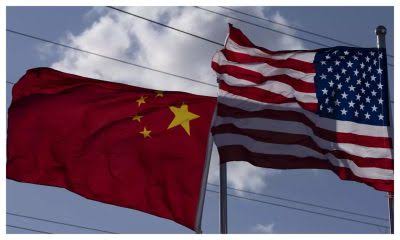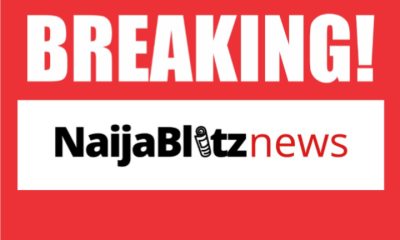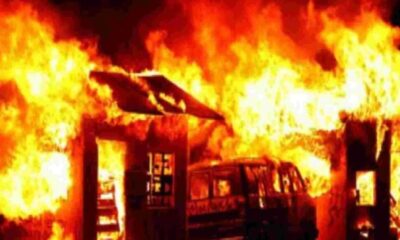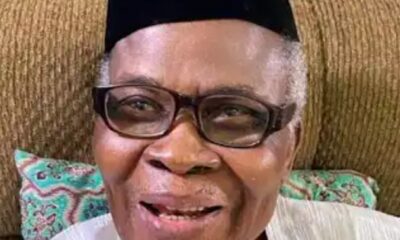News
SAD! Fire Outbreak At Vegetable Market Kills 8, Injures 15
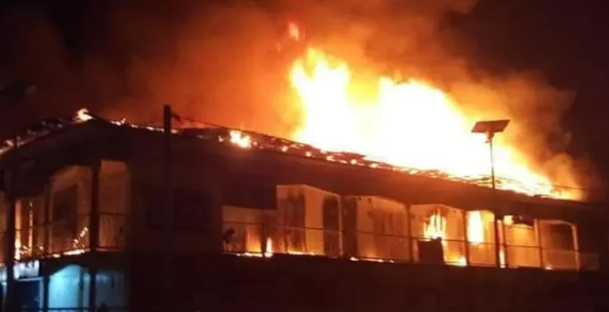
By Kayode Sanni-Arewa
No fewer than eight people have died, and 15 others have been injured following a fire outbreak at a vegetable market in Zhangjiakou City, located in northern China.
The blaze broke out on Saturday morning at around 8:40 am local time at the Liguang market in the Qiaoxi District, northwest of Beijing.
The Qiaoxi District People’s Government confirmed that those injured were promptly transported to hospitals, with their conditions not considered life-threatening. The fire was eventually brought under control by 10 am, and authorities are now investigating its cause.
This incident is part of a broader pattern of deadly fires in China, which are often linked to lax building regulations and inadequate workplace safety measures. State media reported that a fire in Chengdu, a major city in October, hospitalized 24 people suffering from breathing difficulties. Additionally, a fire at a shopping centre in Zigong in July claimed the lives of 16 people.
The ongoing investigation into the cause of the Zhangjiakou market fire aims to prevent further such incidents and address the concerns regarding fire safety standards across the country.
News
Nigeria Needs To Focus on Local Solutions to Fight Poverty – Speaker Abbas

By Gloria Ikibah
Speaker of the House of Representatives, Rep. Tajudeen Abbas, has said the fight against poverty in Nigeria must start at the community level.
Representatives by the Chief Whip of the House, Rep. Isiaka Ibrahim, at the inauguration of a new House Committee focused on community and social development on Wednesday, Abbas stressed that real change will only happen when policies are designed to meet the everyday needs of people in towns and villages.
He also called on the government to create people-friendly programmes that reduce the gap between the rich and the poor.
The event, held at the National Assembly in Abuja, marked the official takeoff of the Committee on Community and Social Development Agency/NG-Cares. Abbas urged members of the Committee to approach their work with honesty and a genuine desire to help struggling Nigerians.
News
White smoke rises, new pope elected at Vatican +Video

By Francesca Hangeior
White smoke billowed from the chimney of the Sistine Chapel on Thursday, signalling that cardinals locked inside have elected a new leader for the world’s 1.4 billion Catholics.
Thousands of pilgrims and curious onlookers in St Peter’s Square cheered and applauded as the smoke appeared and bells began to ring, indicating the 2,000-year-old institution has its 267th pope.
All eyes now turn to the balcony of St Peter’s Basilica to see who has been elected to succeed Pope Francis, an Argentine reformer who died last month after 12 years as leader of the worldwide Church.
The new pontiff will be introduced in Latin with his chosen papal name and address the world for the first time.
He faces a momentous task: as well as asserting his moral voice on a conflict-torn global stage, he faces burning Church issues from the continued fall-out from the sexual abuse scandal to the Vatican’s troubled balance sheets.
Some 133 “Princes of the Church” from five continents — the largest conclave ever — began voting on Wednesday afternoon.
Sworn to secrecy, on pain of excommunication, their only means of communicating their progress to the outside world was by sending up smoke through the chimney of the Sistine Chapel.
On Wednesday evening and then again on Thursday lunchtime, the smoke was black, emitting disappointed sighs from the tens of thousands watching.
But on Thursday afternoon just after 6pm (1600 GMT) the smoke emitted was white, confirming that the Catholic Church has a new spiritual leader.
By tradition, he now enters the Room of Tears — where freshly-elected popes give free rein to their emotions — to don a papal cassock for the first time, before returning to the Sistine Chapel so the cardinals can pledge their obedience.
He will then appear on the balcony along with a senior cardinal, who will announce to the waiting crowds “Habemus Papem” (“We have a pope”).
The pope will then give a short speech and impart his first “Urbi et Orbi” (“To the City and the World”) blessing.
The election has come at a time of great geopolitical uncertainty, which was seen as a key voting issue, along with the rifts within the Church.
Francis was a compassionate reformer who prioritised migrants and the environment, but he angered traditionalists who wanted a defender of doctrine rather than a headline-maker.
Some 80 percent of the cardinal electors were appointed by Francis. Hailing from 70 countries around the world, it was the most international conclave ever.
That was no guarantee, however, that the cardinals would pick someone in his vein.
The question was whether to choose a pastor or diplomat, a liberal or conservative, someone versed in the Curia — the Church’s governing body — or a relative outsider from areas of the world where Catholic faith is thriving.
Before the cardinals were locked into the Sistine Chapel Wednesday, their dean Giovanni Battista Re urged them to choose someone able to protect the Church’s unity.
The next pope must also be able to lead “at this difficult and complex turning point in history”, amid raging conflicts around the world and the rise of ultra-nationalist parties.
The Church has also had difficulty in adapting to the modern world, with declining priest numbers and increasingly empty pews in the West.
The papal inauguration usually takes place less than a week after the election with a mass celebrated before political and religious leaders from around the world.
The new pope will likely do a tour of St Peter’s Square in his popemobile for the first time, before delivering a homily outlining his priorities.
News
Meet the new Pope, Pope Leo XIV +Photo

By Francesca Hangeior
Formerly Cardinal Robert Francis Prevost, he hails from the United States and is the first American to be elected pope in the history of the Roman Catholic Church.
A member of the Augustinian order and former Prefect of the Dicastery for Bishops, Pope Leo XIV brings decades of pastoral and administrative experience to the papacy.
He is a moderate who was close to Pope Francis and spent years as a missionary in Peru, he becomes the Catholic Church’s 267th pontiff, taking the papal name Leo XIV.
-

 Entertainment15 hours ago
Entertainment15 hours agoI’m broke yet accused of money laundering – VDM breaks silence after EFCC release
-

 News2 hours ago
News2 hours agoBREAKING! Finally, White Smoke Emerges From Sistine Chapel as Vatican Elects New Pope
-

 News7 hours ago
News7 hours agoBreaking: Three Serving PDP HoR Members Defect to APC
-

 News15 hours ago
News15 hours agoTomato Ebola Causes Loss of N1.3 Billion, Contributing to Rising Food Prices
-

 News15 hours ago
News15 hours agoEdo police rescue kidnapped PDP chairman, 36 others
-

 News6 hours ago
News6 hours agoEx-Governor Uduaghan, Daughter Dump PDP, Join APC
-

 News8 hours ago
News8 hours agoFinally, IMF deletes Nigeria from its debtors list
-

 News15 hours ago
News15 hours agoSad! Five members of one family die of food poisoning


